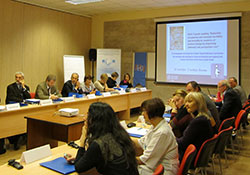Assisting countries in improving the quality of care during pregnancy and after delivery - new WHO tool finalized by experts in Moscow

WHO
According to recent estimates the average decline of maternal mortality in Caucasus and central Asia countries since 1990 is 2.1% while 5.5% is needed to reach the Millennium Development Goal (MDG) target 5A. Half of under-five deaths in the European Region are neonatal deaths and prevention of these is crucial in achieving MDG 4.
Good quality of primary health care is seen as the key to reducing maternal and newborn morbidity and mortality. Differences in care related to social status, gender and ethnicity are important contributors to inequity in health outcomes.
To assess the quality of maternal and newborn care in primary health care, WHO/Europe developed a specific assessment tool in 2011 based on international standards, covering the main clinical aspects of care that help countries identify areas requiring improvement. The quality of care assessment process actively involves national policy-makers, health professionals and service users.
With active involvement of other United Nations agencies and international partnership, this instrument has been piloted in two countries of the WHO European Region in 2012.
Experts involved in the development of the tool and in the pilot assessments joined a group of Russian-speaking experts that have expressed interest in assisting countries of eastern Europe and central Asia in Moscow 31 October – 2 November.
The latest WHO tools and guidelines in improving maternal and newborn health and health care were presented by the representatives of the WHO headquarters.
Exchange of experience and fruitful discussions resulted in finalization of the tool for assessment of the quality of antenatal and postpartum care for women and babies that will be available in English and Russian on the WHO/Europe web site in January 2013.



